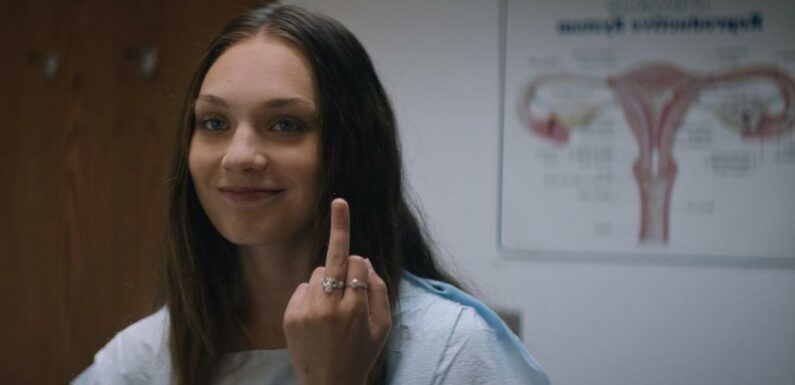
Who am I? Where do I fit in? Am I some kind of misfit? Will I ever be an ex-virgin? Such questions surely occur to every adolescent at one point or another. But only one out of approximately every 5,000 female ones arrive at them for the same diagnostic reason as the heroine of “Bloody Hell.” Molly McGlynn’s second feature focuses on a 16-year-old distressed to discover she has a rare congenital disorder that considerably complicates her nascent sex life, formative sexual identity and indeed basic sexual plumbing. This SXSW-premiering Canadian seriocomedy is a bit less focused and effective than the writer-director’s prior “Mary Goes Round,” but it’s still accomplished, and similarly renders relatable the sometimes self-defeating behaviors of a protagonist who’s got a lot of issues on her plate.
Lindy (Maddie Ziegler) is a new arrival in suburban Sudbury, Ontario, with mother Rita (Emily Hampshire), a therapist who’s still working on getting her life back in gear years after the girl’s father abandoned them both. By contrast, adapting to an unfamiliar high school seems to be going fairly well for Lindy, who immediately acquires a best friend in fellow track-team member Vivian (Djouliet Amara). She also develops a crush on classmate Adam (D’Pharaoh Woon-A-Tai), and that feeling seems to be mutual.
Excited anticipation leads Lindy as far as seeing a gynecologist for birth control pills. But since she has yet to begin menstruation, a routine examination is performed. That gets her referred to a specialist, who rather callously announces news that is hard to digest: She has Mayer-Rokitansky-Kuster-Hauser syndrome, a condition that begins at the fetal stage. In Lindy’s particular case, it means she was born without a uterus, cervix or most of a vaginal canal; will never have a period, or be able to carry a child; and is going to find it “virtually impossible to have sex without manual or surgical assistance.” The only immediate, partial solution offered comes in the form of plastic dilators she’ll need to, er, exercise with daily, because (as a more encouraging female medico puts it) “the vagina is an amazing muscle and … you’re just going to have to stretch it out.”
This discovery of intimate anatomical “difference” makes our heroine feel shamed and freakish. She squeamishly fends off mom’s attempts at supportiveness, and absolutely refuses to discuss this crisis with anyone else. Nonetheless, her friends certainly notice something is wrong, not least Adam, who can only interpret her sudden recoil from physicality as a personal rejection. In her attempt to understand just where she fits in now, Lindy attends — then flees — an afterschool LGBTQ students’ meeting. She also develops a possibly-flirtatious friendship with Vivian’s androgynous acquaintance Jax (Ki Griffin), who identifies as “intersex” due to some anatomical birth anomalies of her own.
Pretty much everyone in her immediate circle is sympathetically concerned by Lindy’s suddenly mercurial, secretive demeanor. But she can’t bring herself to confide in anyone, which triggers some reckless behavior — ultimately including a drunken blab to a near-stranger that makes her situation very public indeed, inviting the taunts of much-less-empathetic peers.
Until very late, “Bloody Hell” refrains from soapboxing, providing a fair amount of info on MRKH and related matters as part of the central protagonist’s self-education. Even a climactic burst of garrulousness (particularly a stock climactic “big speech” facing down all bullies) works well enough in dramatic terms. And Lindy’s often impulsive, ill-advised behaviors make sense for her age — never mind that these attempted coping mechanisms often make things worse, or that more mature viewers may wonder why she doesn’t simply tell those closest to her what she’s hiding from them.
Nonetheless, McGlynn’s script feels meandering at times, cramming too many ideas in, losing narrative steam with too much time — and/or not enough — devoted to Hampshire’s mother. The actress (concurrently in another SXSW premiere, “Appendage”) is good as usual. But Rita has her own bundle of issues, and they aren’t developed well enough to seem like more than an unnecessary, sporadic distraction from the central character’s complicated-enough predicament. In contrast, “Mary Goes Round” dealt with alcoholism, dysfunctional family dynamics and more in a fashion that more smoothly balanced humor and seriousness, at just 86 concise minutes to boot.
The young actors are all appealing and convincing, even if they seem a bit long in the tooth for their characters’ purported ages. Aesthetically, the film reps a step up from the director’s earlier feature, with Nina Djacic’s widescreen cinematography and Thea Hollatz’s production design (esp. for the main protagonists’ bedrooms) providing a handsome look. There’s also a busy soundtrack, though some of the cuts utilized by various artists are more welcome than others.
While imperfect, “Bloody Hell” does entertainingly offer food for thought via an important overall point made in non-preachy form: Nature indeed does have room for variation in gender and sexual norms, no matter how loudly political or religious conservatives these days protest otherwise.
Read More About:
Source: Read Full Article